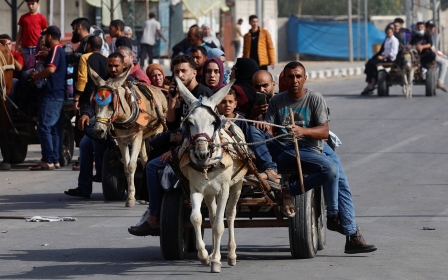Israel-Palestine war: Settler attacks and Israeli restrictions paralyse West Bank economy

There's a look of despair in Ibrahim Omran's eyes.
Palestinians in the village of Burin, some 7km south of Nablus in the occupied West Bank, have been living in a state of perpetual fear as Israeli settler attacks and Israeli-ordered shutdowns take a devastating toll on the local economy.
"We cannot move, we cannot work, what can we do?" Omran, the head of the village council, told Middle East Eye.
"If I want milk or bread for my children, how do I get them?" he asked.
For more than six weeks, three million Palestinians across the occupied West Bank have been slipping into a deep paralytic state since Israel tightened restrictions on the territory when it launched its military assault on the besieged Gaza Strip.
Stay informed with MEE's newsletters
Sign up to get the latest alerts, insights and analysis, starting with Turkey Unpacked
As air strikes continue to rain down on Gaza, Israeli settlers and the army have increased their deadly raids on Palestinian neighbourhoods, villages and cities; with more than 200 Palestinians killed across the West Bank since 7 October.
Omran said that a tense atmosphere had taken hold over his village, with shops and business nearly always closed and many fearing travelling between cities and even surrounding villages.
"There is poverty everywhere. No food, no salaries - I have 12 shekels [$3.20] in my pocket. The council cannot charge people for electricity or water because the people cannot pay," he said.
According to Omran, the economic situation began to worsen when Israel stopped issuing work permits for Palestinian workers, resulting in around 500 construction workers from Burin losing their jobs.
The issue took an even greater turn for the worse when Israel threatened to suspend payments to the Palestinian Authority (PA) - which exercises limited autonomy in parts of the occupied West Bank.
Ultranationalist Finance Minister Bezalel Smotrich issued the threat after claiming the PA supported the Hamas-led attack on Israel.
Israel later said it would proceed with the payments in the occupied West Bank but would withhold funds bound for Gaza, where the PA helps cover public sector wages and pay for electricity.
Follow Middle East Eye's live coverage of the Israel-Palestine war
Then came the settler attacks.
Omran said that while settler violence has increased in frequency over the years, the latest uptick coincided with this year's olive harvest season, which occurs between October and November.
Settlers are estimated to have destroyed more than 3,000 olive trees since 7 October, wiping out groves that had been passed on for generations as ancestral inheritance.
At a council building overlooking Burin and the illegal Israeli settlements of Yitzak, Braha and Gvat Roneen, Omran said that the settler attacks would not have been possible without the help of the Israeli military.
"Settlers organise attacks under the military's supervision. They cut, burn or spray trees with chemicals in order to kill them. They won’t allow us to collect olives in the two thirds of the village which are in Area C," he said.
"In many areas the settlers will shoot at us if we collect the olives. Sometimes they wait till you have worked all day, and only after we have gathered the entire harvest do they come and take the olives."
Plunging Palestinians into poverty
In the village of Jamma'in, some 6km south west of Burin, the manager of a local olive oil company said that production at his firm was down by 40 percent due to Israeli settler attacks and Israeli restrictions.
Meanwhile unemployment has soared as the estimated 150,000 day labourers who used to travel every day to Israel have had their permits suspended.
With salaries in Israel on average about twice the local rate, the Palestinian day labourers used to bring back much needed hard cash to the local economy. Now they added to the burgeoning unemployment rate, as well as driving down the local day rate for labour.
Mamummad Saqfezhait, who ran a successful corporate law firm with seven employees, said he was forced to slash his staff's working hours to only one day a week as the Palestinian court system was suspended since 7 October because "roads were closed on account of checkpoints and settler violence".
To make matters worse, the banking system is frozen. Land surveyor Murad Najar said that "every cheque is returned," producing as evidence a wad of bounced Bank of Palestine checks from his wallet.
"Over the last month my income has been zero. I cannot pay my employees. I don't even have the money to pay my electricity bill."
According to the United Nations, the Palestinian economy - worth an estimated $20.4bn before the war began - fell by four percent and is set to collapse by a further four percent this month.
If it goes into a third month, the UN projects a 12 percent collapse, plunging 600,000 people into poverty.
Ayman Shakaa, the director of a social centre in Nablus, said that while the rising unemployment rate was a cause of concern, the horrors unfolding in Gaza were far more devastating.
"Nobody here in the West Bank complains because the situation in Gaza is far worse," he told MEE. "You can't shout about not being able to eat when people are being massacred."
The death toll of Palestinians killed in Gaza has surpassed more than 13,000, the vast majority of whom are women and children.
This article is available in French on Middle East Eye French edition.
Middle East Eye delivers independent and unrivalled coverage and analysis of the Middle East, North Africa and beyond. To learn more about republishing this content and the associated fees, please fill out this form. More about MEE can be found here.





